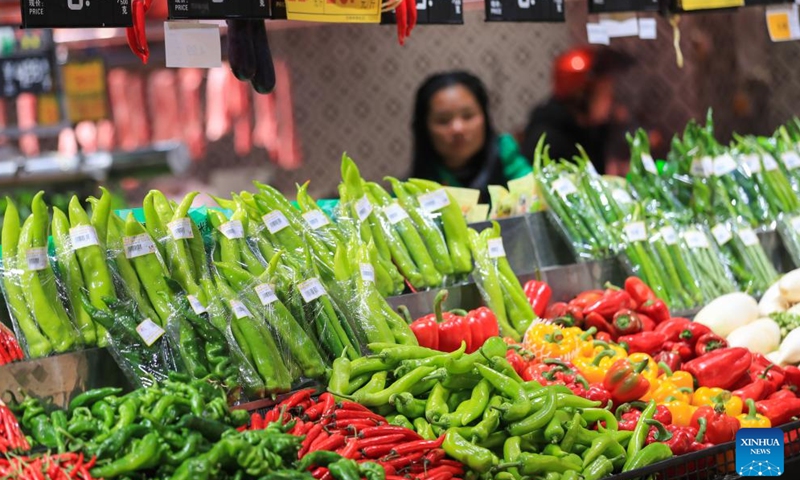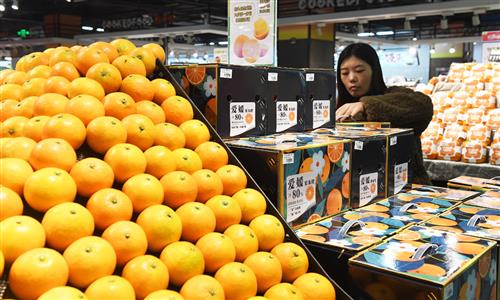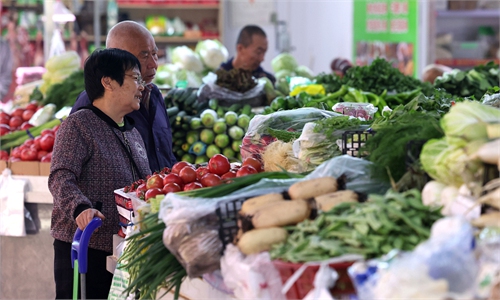
A customer shops at a supermarket in Congjiang County, southwest China's Guizhou Province, March 9, 2024.File Photo: Xinhua
China's consumer price index (CPI), the main gauge of inflation, rose by 0.3 percent year-on-year in May, the National Bureau of Statistics (NBS) said on Wednesday, which indicates a steady recovery in domestic demand.The reading comes as Chinese consumer spending has maintained pace, laying the foundation for a strong recovery of the economy. Analysts believe that the recent rise in consumer spending points to a stronger rebound in the retail market.
On a monthly basis, consumer prices fell by 0.1 percent, a slight drop from a month earlier. The fall was smaller than the 0.2-percent average drop for the corresponding period in the past 10 years.
From January to May, China’s CPI has risen by 0.1 percent year-on-year. Core CPI excluding food and energy prices saw a moderate year-on-year increase of 0.6 percent. China’s retail market was largely stable in May, NBS statistician Dong Lijuan said.
“The 0.3-percent rise in CPI in May is a promising sign of growth, albeit at a moderate pace. This indicates a positive momentum for continued improvement in production, which will require continuous support from both policymakers and market participants,” Li Changan, a professor from the Academy of China Open Economy Studies at the University of International Business and Economics, told the Global Times on Wednesday.
A large-scale retail trade-in program was launched in March, aiming to promote renewal of industrial equipment and consumption of daily goods, which is expected to inject vitality into consumer spending this year, Li said.
Food prices were the main factors weighing down CPI in May. Prices of eggs, fruits and edible oil all dropped due to sufficient market supply, according to the NBS.
Meanwhile, the NBS said that the producer price index (PPI), the gauge of manufacturing sector inflation, fell by 1.4 percent in May, which narrowed considerably by 1.1 percentage points from April, mainly due to the rise in international commodity prices and the improvement of domestic market demand, Dong from the NBS said.
An improvement in China’s manufacturing industry was reflected in the PPI reading, as industrial production picked up on sustained overseas demand, Li said, adding that China’s massive manufacturing sector has improved steadily in recent months, amid consistent government policy support and improvement in overseas market demand.
The CPI is expected to experience a slow rebound over the coming months, NBS spokesperson Liu Aihua predicted, adding that as the weather gets warmer and market supply increases, food prices are expected to remain at a seasonal low. Trade-in policies are likely to boost demand for industrial goods, leading to stable prices with a slight increase. Service prices are also expected to keep rising, driven by the gradual recovery of services demand.
China has rolled out a good number of consumption stimulus programs, such as stimulating purchases of vehicles, boosting the trade-in of consumer goods and a large-scale industrial equipment renewal.
Analysts said that trade-in program would fuel consumption and open up a huge market worth trillions of yuan this year. They expect retail sales to grow by over 5 percent in 2024, helping the economy to navigate through rising headwinds and meet this year’s GDP growth target of about 5 percent.


